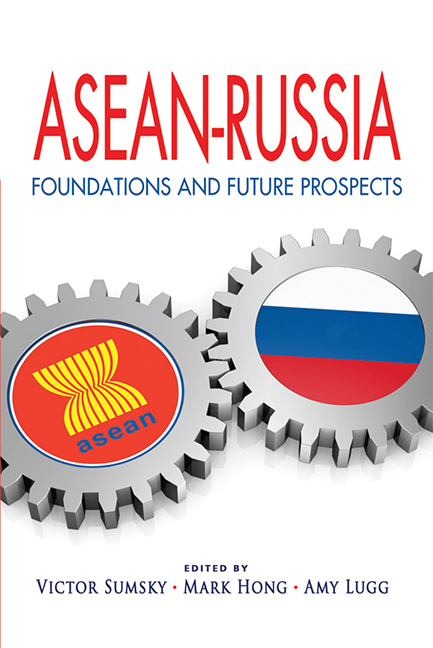Book contents
- Frontmatter
- Contents
- Foreword
- Preface
- About the Contributors
- Keynote Address
- Opening Remarks
- Keynote Address
- Introduction: Russia and the ASEAN Member States: Political and Economic Cooperation in Progress
- SECTION I WISEMEN'S VIEWS
- From Energy Partnership to Comprehensive Security in the Asia Pacific
- The Rise of Asia and Russia's Options
- ASEAN Regionalism and the Future of ASEAN-Russia Relations
- Thoughts on Asian Community Building
- Welcoming Russia's Participation
- SECTION II GEOPOLITICS
- SECTION III BILATERAL RELATIONS
- SECTION IV Business and Economics
- SECTION V CULTURE AND EDUCATION
- EPILOGUE
- Index
Welcoming Russia's Participation
from SECTION I - WISEMEN'S VIEWS
Published online by Cambridge University Press: 21 October 2015
- Frontmatter
- Contents
- Foreword
- Preface
- About the Contributors
- Keynote Address
- Opening Remarks
- Keynote Address
- Introduction: Russia and the ASEAN Member States: Political and Economic Cooperation in Progress
- SECTION I WISEMEN'S VIEWS
- From Energy Partnership to Comprehensive Security in the Asia Pacific
- The Rise of Asia and Russia's Options
- ASEAN Regionalism and the Future of ASEAN-Russia Relations
- Thoughts on Asian Community Building
- Welcoming Russia's Participation
- SECTION II GEOPOLITICS
- SECTION III BILATERAL RELATIONS
- SECTION IV Business and Economics
- SECTION V CULTURE AND EDUCATION
- EPILOGUE
- Index
Summary
We should welcome Russia's active participation and constructive role in the development and progress of twenty-first-century Asia, which could lead, in the words of the eminent Australian strategic thinker Hugh White, to the shaping of “A Concert of Asia”.
Russia, after all, is an Asia-Pacific power that is not a newcomer to the region. Since about the mid-twentieth century, with the rise of anti-colonial nationalism that resulted in the emergence of new Asian states e.g. the Republic of Indonesia, this paralleled with the heightening adversity between the victors of the Second World War, usually referred to as the Cold War, the Soviet Union in various models and structures had cooperative agreements with the People's Republic of China, India, Vietnam, North Korea and Indonesia. It must be noted that the Soviet Union's active support to Indonesia in the early 1960s, especially by assisting the modernization of Indonesia's military capability, speeded up the diplomatic solution of the so-called West New Guinea conflict with the Netherlands, a residual colonial problem.
Thus, when the “new” Russia intends to play a more active and constructive role in the dynamics of a progressing Asia, she does not need to start from scratch. The basic data concerning Asian countries and the expertise in dealing with Asians, presumably, are still stored in the archives and in the minds of Russians.
Of course, the strategic setting of twenty-first century Asia is entirely different compared with the final decades of the last century. Let us take the Association of Southeast Asian Nations (ASEAN) as a case in point. When five foreign ministers representing five Southeast Asian countries signed the ASEAN Declaration in Bangkok on 8 August 1967 that was and still is an historical event of grand proportions. First of all, just try to visualize the situation in Southeast Asia during that second half of 1967.
Indonesia, the largest country in this region, had just recovered from an abortive coup planned and initiated by the Indonesian Communist Party, resulting in the murder of almost the entire general staff of the Indonesian National Army.
- Type
- Chapter
- Information
- ASEAN-RussiaFoundations and Future Prospects, pp. 37 - 42Publisher: ISEAS–Yusof Ishak InstitutePrint publication year: 2012



